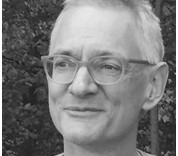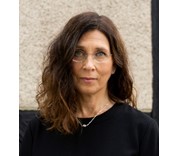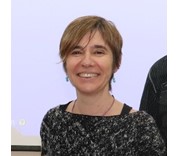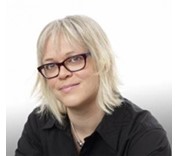Agenda > Keynote speakers
Keynote speakers
Programme of keynotes (Time slots correspond to French Time Zone)
|
Date
|
Time slot
|
Session
|
Keynote speaker
|
|
Tuesday, October 6th
|
2:50-3:30 pm
|
Opening Session
|
L. Wick
|
|
Wednesday, October 7th
|
9:00-9:40 am
|
Micro-organisms in complex systems: biological interactions, pollution & climate change (#2)
|
H. Guasch
|
|
Wednesday, October 7th
|
3:40-4:20 pm
|
Micro-organisms for environmental risk assessment (#4)
|
C. Griebler
|
|
Thursday, October 8th
|
9:00-9:40 am
|
Impact of contaminant on microbial functions (#1)
|
S. Hallin
|
|
Thursday, October 8th
|
2:20-3:00 pm
|
Micro-organisms role in contaminants (eco)dynamics & application to bioremediation (#3)
|
J. Lloyd
|
|
Friday, October 9th
|
2:00-2:30 pm
|
From research to end-users (#5)
|
I. Lavoie
|
Opening Conference
|
Dr. Lukas Y. Wick,
Helmholtz Centre for Environmental research UFZ, Leipzig, Germany
Dr. Lukas Y Wick is head of the Bioavailability Group and deputy head of the Department of Environmental Microbiology at the Helmholtz Centre for Environmental Research – UFZ in Leipzig (Germany). His research interests relate to the bio-physical and ecological drivers of microbial transformation of organic contaminants for improved environmental (bio)-technology. He received his PhD in synthetic bio-organic chemistry from the University of Basel (Switzerland). After postdoctoral stays in environmental chemistry and microbiology at the Massachusetts Institute of Technology MIT (USA) and the Swiss Federal Institute of Aquatic Science and Technology EAWAG he joined the Soil Science Laboratory of the Swiss Federal Institute of Technology Lausanne EPFL. In 2004 he became head of the Bioavailability Group the Helmholtz Centre for Environmental Research – UFZ. He was appointed adjunct professor at the Faculty of Engineering of the University of Alberta, Canada (2012-2015) and is since 2014 speaker of UFZ’ key research area ‘Controlling Chemicals Fate’.
|

|

Session "Impact of contaminant on microbial functions"
| Prof. Sara Hallin,
Swedish University of Agricultural Science, Sweden
Sara Hallin is professor and holds the chair in Soil Microbiology at the Swedish University of Agricultural Sciences since 2012. Her research area is microbial ecology of bacteria and archaea, especially those involved in nitrogen cycling. Her research spans several environments and systems, including different terrestrial ecosystem such as agricultural soils, arctic soils, and wetlands, aquatic environments and engineered systems. She has a MSc in agronomy and a PhD in microbiology, focused on denitrification in wastewater treatment systems. After her PhD, she did pioneering work to target denitrifying bacteria in the environment by developing molecular markers targeting genes encoding key enzymes in the denitrification pathway at the time when only taxonomic markers were used. In 2005 she was appointed Associate professor and became professor in microbial ecology in 2011. She is internationally known for her work on the ecology and genomics of denitrifying and nitrous oxide reducing microorganisms. Currently, she is continuing her research on nitrogen cycling ecology with the aim to understand relationships between the ecology of microbial communities, the biogeochemical processes they perform and the corresponding ecosystem functions.
|

|

Session "Micro-organisms in complex systems: biological interactions, pollution & climate change"
|
Dr Helena Guasch
Blanes Centre for Advanced Studies, Spain
Researcher at the CEAB of the CSIC in Blanes, Girona (Spain) since August 2018, Helena Guasch has been teaching ecology subjects as Adjunct Professor of the Department of Environmental Sciences of the University of Girona (UdG) and doing her research at the Institute of Aquatic Ecology for more than 15 years. Her main expertise is fluvial ecology and ecotoxicology, focused on the ecological effects of chemicals at different levels of biological complexity (from biomarkers to ecosystem processes) and scales of study (in micro- mesocosms and field experiments and watershed-scale investigations). Her background is fluvial ecology (with a doctoral thesis on drivers of primary production). She expanded her scope to investigate the ecology of human impacted aquatic systems. In this context, she has been looking for biological indicators of different types of impact and of exposure to different pollutants: molecular biomarkers of stress, diatom indicators and ecosystem functions, among others. Her research is now considering the principles of sustainable development, as the best way to integrate research questions into a common framework that also takes into account the economic and social challenges. In the most basic aspects of the research, she is very interested in validating several “ecotoxicomic” approaches to be able to understand the reciprocal relationships between human alterations and the role played by microbial communities in the quality of water and the health of ecosystems, understanding the causes and effects of nutrient pollution, an old but prevalent and growing environmental problem and in the challenging study of the interlinks between biofilms and the “plastisphere”.
|

|

Session "Micro-organisms role in contaminants (eco)dynamics & application to bioremediation"
|
Prof. Jonathan LLoyd,
Manchester University, United Kingdom
Professor Lloyd currently leads a multidisciplinary geomicrobiology group working at the interface between biology and geology. His research focuses on the mechanisms of microbial metal reduction, with emphasis on the environmental impact and biotechnological applications of metal-reducing bacteria. Current activities are supported by funds from NERC, BBSRC, EPSRC, the EU and industry. He is also a Senior Visiting Fellow at the National Nuclear Laboratory, which helps support the development of his nuclear geomicrobiology programme.
|

|

Session "Micro-organisms for environmental risk assessment"
|
Prof. Dr. Christian Griebler,
University of Vienna, Austria
Christian Griebler is a groundwater ecologist by heart. He studied zoology and limnology and received his PhD in 1998 from the University of Vienna, Austria. After a PostDoc stay (2000-2003) in Tuebingen, Germany, at the Center of Geoscience, he accepted a group leader position at the Helmholtz Center Munich, Germany. In 2014, he became acting head of the Institute of Groundwater Ecology in Munich. In 2019 he returned to Austria accepting a full professorship in limnology at the University of Vienna. C. Griebler’s research foci are in groundwater microbial ecology, food web dynamics, carbon cycling, contaminant biodegradation and the assessment and monitoring of ecosystem health. He is advocate for the implementation of ecological measures to groundwater monitoring schemes in national and international water laws.
|
 |

Session "From research to end-users"
|
Prof. Isabelle Lavoie,
INRS, Canada
Professor Lavoie's work focuses on monitoring aquatic ecosystems health status using biological descriptors. She is particularly interested in responses of river biofilms to anthropogenic disturbances (eg, urban context, agricultural, mining). The Water biological integrity assessment tool DIEC (Diatom Index for Eastern Canada), developed with colleagues in 2005, is now a water quality indicator used by a variety of water management organizations (Quebec and Ontario Ministries of the Environment, Government of Canada, watershed organizations, private companies). Her research objectives are to develop bioindicators and biomarkers of stress, by studying the effects of anthropic disturbances on the nutritional quality of biofilms (eg fatty acids) and the consequences on the food chain.
|

|
|









